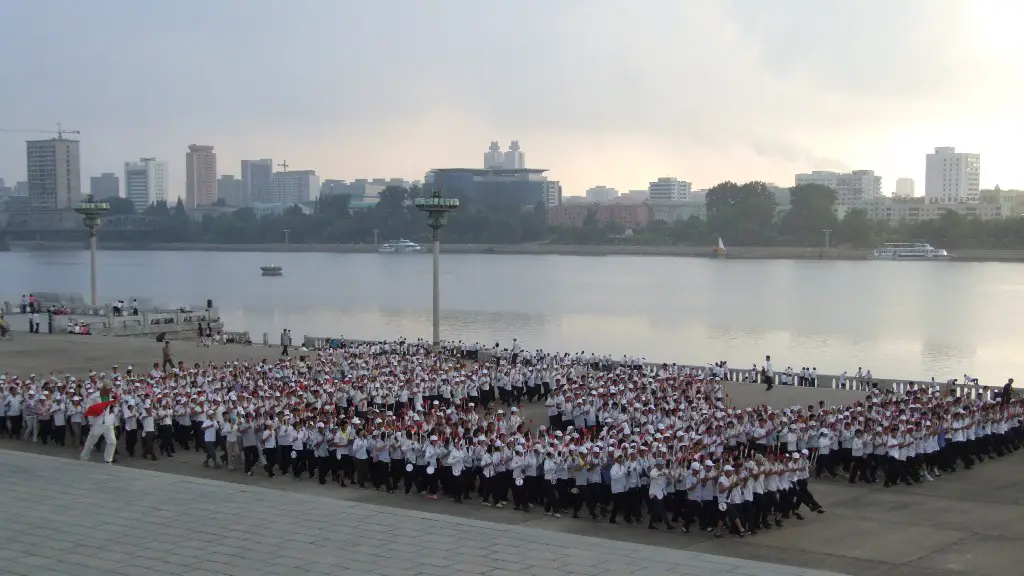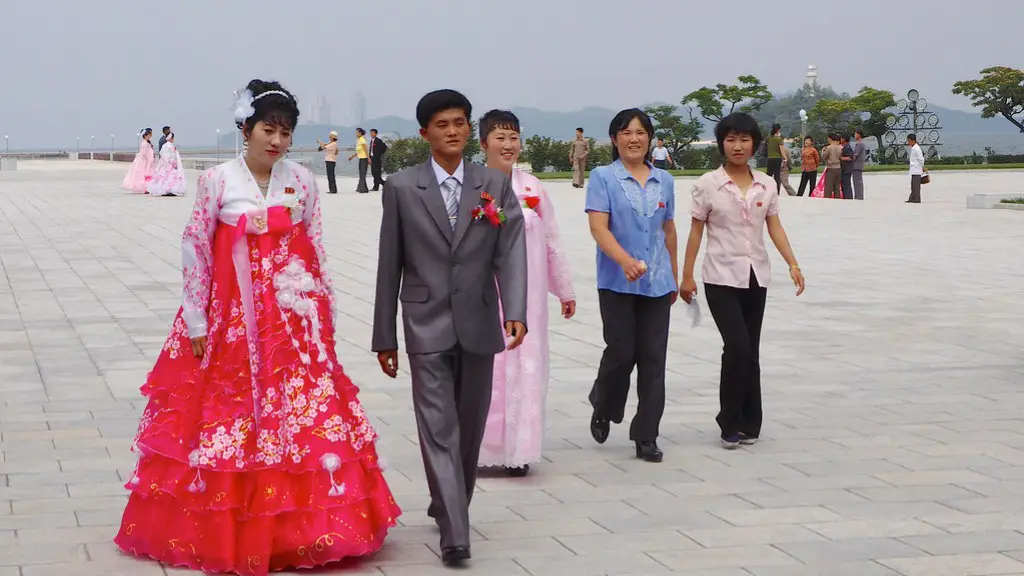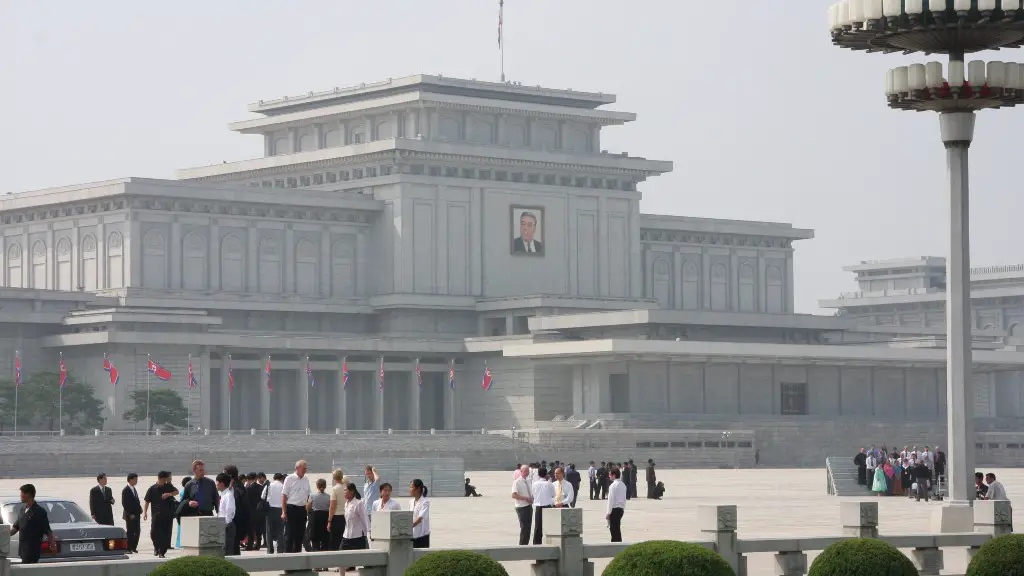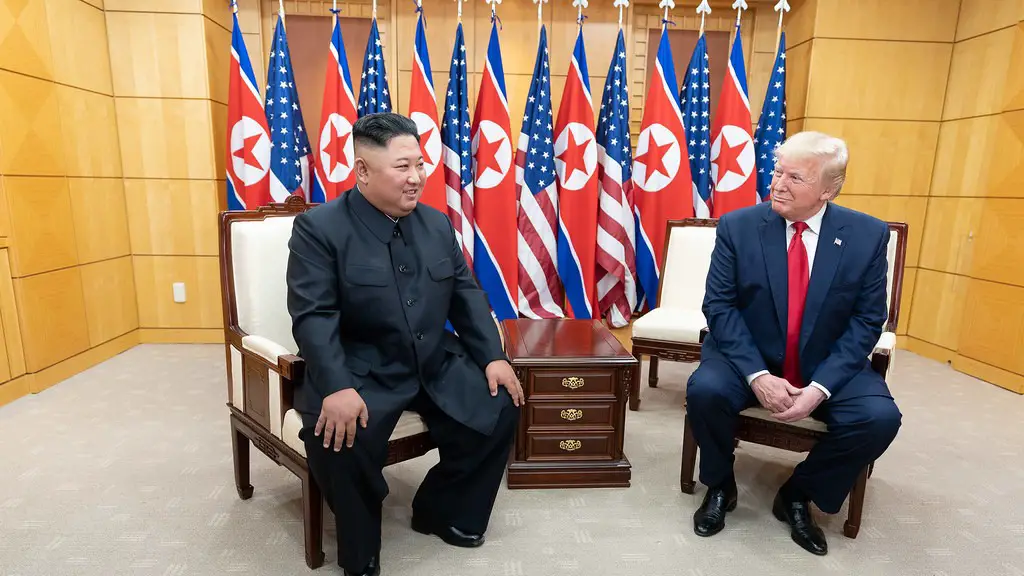Government Brutality
North Korea is often criticized for its oppressive government, particularly its abuses of human rights. Freedom of speech, assembly, and religious expression are prohibited in the country. Pyongyang, North Korea’s capital, is under the strict control of the government, and all activities of citizens must be approved by the state. In addition, citizens are not allowed to leave the country without special permission. The human rights organization Amnesty International estimates that up to 120,000 people are incarcerated in North Korea’s political prison camps, where they are subjected to brutal labor, torture, and execution. It is believed that many more are killed in extrajudicial executions either by firing squad or by public methods such as hanging.
Lack of Freedom
The realization of human rights is a challenge not just in North Korea, but in many other countries as well. However, North Korea is distinct in its extreme lack of freedom for its citizens. In North Korea, the state has complete control over the people and their day-to-day lives. All media outlets are owned and regulated by the government, and all other forms of communication, such as phones and the internet, are strictly censored. Furthermore, the state executes anyone who speaks out against the regime. North Korea has a policy that does not allow its citizens to leave the country and permeates fear in them. Fines, arrest and even death penalty await those who leave the country without permission.
Economic Misery
The economy of North Korea is heavily dependent on foreign aid, with China and South Korea being the two largest donors. This dependence on foreign aid has consequences, namely that the economic hardship often worsens when aid is withheld in response to the regime’s human rights abuses. Additionally, North Korea has a poor system of taxation, and its people suffer from high levels of unemployment. Corruption is rampant and the country’s infrastructure is in a state of disrepair. Furthermore, the sanctions imposed on North Korea have only exacerbated its economic woes, and many of its citizens live in abject poverty.
Food Insecurity
The economic crisis in North Korea has had a direct impact on its people’s access to food. The World Food Program estimates that 10.3 million North Koreans are at risk of food insecurity, with 4.4 million in an increasingly vulnerable state. The average North Korean is malnourished and underweight, and it is not uncommon for families to rely on the generosity of family members residing outside the country. In addition, the country is regularly hit by floods and droughts, making it even harder for its people to access food.
Government Propaganda
The government of North Korea is well known for its use of propaganda to manipulate its citizens. State-run news outlets focus on praising the ruling family while simultaneously blaming other governments, particularly the United States, for the country’s miserable conditions. In the eyes of the government, any dissent is considered treason and can lead to imprisonment or even death. As a result, citizens are discouraged from voicing any views that are not in agreement with the government’s official line.
Cultural Restrictions
The government of North Korea also exerts its control over its citizens by limiting the expression of North Korean culture. Traditional Korean culture is heavily discouraged and replaced by a cult of personality in which citizens are expected to strictly adhere to the government’s ideals and values. The state strictly monitors its citizens’ behavior and those who express independent thoughts or beliefs are punished.
Lack of Educational Opportunities
North Koreans also suffer from a lack of educational opportunities. The education system is heavily controlled by the government and school curriculums are tailored to conform to the state’s ideology. Furthermore, the government places increasing emphasis on loyalty to the regime rather than on academic excellence. This has resulted in a lack of knowledge, particularly in science and engineering, leaving North Koreans ill-equipped to compete in the global economy.
Deprivation of Basic Human Rights
At the heart of the matter is the fact that North Koreans are deprived of their basic human rights. Freedom of speech is stifled, economic opportunities are limited, and the people are denied access to a quality education. The citizens of North Korea have no way to advocate for their rights and are often left with few options. This lack of freedom is what makes North Korea one of the worst countries in today’s world.
Forced Labor
Forced labor is another form of oppression and abuse in North Korea. Citizens are often forced to work in inhumane and unsanitary working environments for little or no pay for long hours with scarce resources and practically none of the rights normally accorded to workers in other countries. Forced labor is often used as a tool of punishment, with prisoners receiving little to no compensation while they work within the prison camps. This is a violation of international human rights law and a clear indication that North Korea is one of the worst countries in the world.
Censorship of The Arts
For North Korea citizens, censorship of the arts is a significant form of oppression. Music, art, literature, and film must all be approved by the state and must adhere to the government’s ideology. North Koreans are not allowed to express themselves or think independently, or even critically, about their circumstances and the state of their nation. This oppressive environment is prohibitive for creative expression, silencing artists and intellectuals and stifling the potential of North Korean culture.
Military Threat
The North Korean government is also a threat to its neighbors and the world at large. North Korea has a large and well-equipped military, and despite threats of economic sanctions and disarmament, Pyongyang continues to develop its nuclear and ballistic missile programs. North Korea has, in the past, threatened other countries with military force and has held the world in its grip of fear.
Poor International Relationships
North Korea is also an international isolationist, allowing few foreigners into the country and having limited contact with the outside world. This has a negative impact on economic growth and the citizens’ access to food and medicine. North Korea does not currently maintain formal diplomatic relations with many countries, further isolating its people and its leaders.
Secrecy and Paranoia
The government of North Korea is shrouded in secrecy, and its leaders are known for their extreme paranoia. The government has long been accused of plotting against the outside world and instilling fear in its citizens. The state has a history of arresting and executing those who it believes are a threat to its rule, leaving North Korea in a state of constant terror and unrest.
Lack of Democracy
North Korea is a totalitarian state in which democracy is virtually nonexistent. All power is concentrated in the hands of the ruling family, and citizens have no say in the country’s political decisions. Elections are held, but are more a formality than anything else, as the outcome is invariably the same. As a result, the country has little hope of ever developing a true democracy, leaving its future uncertain and its citizens without a voice.



